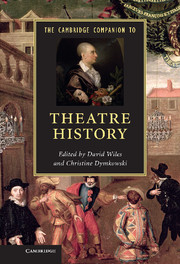Book contents
- Frontmatter
- Contents
- Illustrations
- Notes on Contributors
- Acknowledgements
- Part I Why?
- Part II When?
- Part III Where?
- Part IV What?
- Part V How?
- 15 The nature of historical evidence: a case study
- 16 The visual record: the case of Hamlet
- 17 Museums, archives and collecting
- 18 Re: Enactment
- 19 The internet: history 2.0?
- Index
- References
19 - The internet: history 2.0?
from Part V - How?
Published online by Cambridge University Press: 05 February 2013
- Frontmatter
- Contents
- Illustrations
- Notes on Contributors
- Acknowledgements
- Part I Why?
- Part II When?
- Part III Where?
- Part IV What?
- Part V How?
- 15 The nature of historical evidence: a case study
- 16 The visual record: the case of Hamlet
- 17 Museums, archives and collecting
- 18 Re: Enactment
- 19 The internet: history 2.0?
- Index
- References
Summary
Valorising liveness, in the face of a threat from the endlessly remediated art of the day, performance studies has tended to reject the historical; on the other hand, documentation of the live event has become not only a funding imperative but a personal obsession with many practitioners. It is not enough to do what we do; we must record it, and put it on YouTube. In the spirit of this take – or assault – upon historiography, this essay begins with a live moment that has led to a revision of the plan of this book, and continues with some perhaps uncomfortable historiographical questions.
On 18 June 2010 the editors called together a conference of the contributors to this volume, and an audience of interested scholars and postgraduate students, to discuss and co-ordinate approaches to its content. I (Jacky Bratton) spoke late in the day, with a brief to address the history of ‘the comic’ – solo performers of humorous material – and to suggest how the dominant aesthetic has variously appropriated, discarded, hidden or demonised the ‘popular’ art of the entertainer, and then suggest what the historian might do about this. I decided to demonstrate the complexities by showing a picture (Fig. 36) found on a calendar and asking delegates to name the performer. Of course they could not; as I had hoped, they did not even guess right as to the gender of the figure posing perfunctorily as a monster chicken, clamp-jawed, toothless and befeathered, in skull cap and big three-toed comedy boots.
- Type
- Chapter
- Information
- The Cambridge Companion to Theatre History , pp. 299 - 313Publisher: Cambridge University PressPrint publication year: 2012



